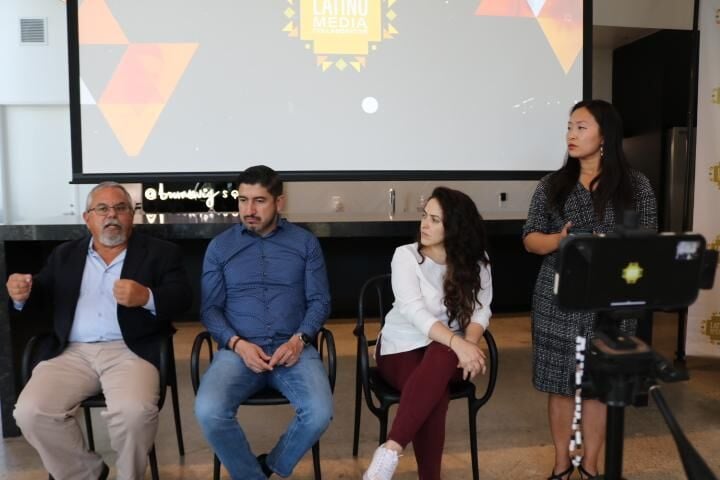The Latino community’s experiences, perspectives and challenges related to racism are the focal point of the Latino Media Collaborative’s (LMC) anti-hate, multi-media campaign called “Color y Raíces: Encara el Racismo” (Color and Origins: Confront Racism).
On Wednesday, LMC, the parent organization of CALÓ NEWS, hosted a media briefing at its Downtown Los Angeles offices to present some of the campaign’s initial research findings and implications that highlighted the need for greater outreach, education and dialogue within the Latino community regarding racial issues. The official launch of the campaign will take place in October.
Campaign’s Origin
Arturo Carmona, LMC’s president and founder, said the campaign’s research began approximately eight months ago and originated after the LA City Hall scandal involving former Los Angeles City Council President, Nury Martinez, when secretly taken audio recordings captured openly crude and racist remarks made by Martinez and former council member Gil Cedillo and current council member Kevin de León
“After that occurred, we knew we had to do something to support the Latino community in sharing their experiences with hate and racism and to also get a sense of the Latino community’s perceptions and interest when it came to advancing intellectual relationships through anti-racism initiatives,” Carmona told CALÓ NEWS. “The initial focus of this campaign will be straightforward but fundamental to ensuring that our communities embrace dialogue on race. The research tells us that there is goodness and a willingness in our community to build bridges of collaboration with other races. This will be fundamentally important to dismantle misconceptions and build greater consciousness on these issues with rank and file community members.“

Carmona offering opening remarks. Photo by Michelle Zacarias.
To prepare for the launch and successfully identify the focus of the campaign and initiative, “Color y Races: Encara el Racismo,” Carmona said that LMC enlisted three traditional research methods: literature review, focus groups and polling, in order to understand the Latino community’s experience and understanding of race ideologies.
The research was led by Paulina Lanz, doctoral candidate at USC Annenberg, Leadership Savvy founder Julie Truong, who has 20 years of experience in group facilitation, leadership and community development, and Gary Segura, president and co-founder of BSP Research and former Dean of the UCLA Luskin School of Public Affairs.
Literature Review and Focus groups
The literature review component, conducted and led by Lanz, was composed of a comprehensive review of research on discrimination and marginalization of Afro-Latinos, Indigenous people and other minorities of Latinos in the United States.
Focus groups, which were led and facilitated by Truong, were made up of exploratory conversations with a U.S.-born English-speaking group of Latinos (including 1st, 2nd and 3rd generation immigrants with higher socio-economic/education status) and a Spanish-speaking group (foreign-born immigrants to the U.S. with lower socio-economic status and lower educational attainment).
The focus groups tackled a variety of issues, such as: levels of comfort and openness in discussing race, encounters with racism, interracial relations, the complexities of skin color and cultural perceptions within the Latino community.

Lanz presenting her research. Photo by Michelle Zacarias.
Lanz said that one of the key findings of the focus groups was that most participants were open to and interested in helping to advance intercultural relations, as well as engaging in conversations about race and racism. Another key finding of the focus group included learning that most participants agreed that “Latinx” is not a term they like to use or would use to describe themselves. “They speculated that it is a relatively new term, and some reported feeling insulted or upset when they saw the term ‘Latinx’ used,” as stated in the summary.
In addition, Lanz said that one of the most interesting conclusions among the Spanish-speaking group was that overall they felt comfortable discussing race with friends, family and colleagues, unlike the English-speaking participants, who, although open to it, reported they do not actively discuss race with their loved ones or colleagues.

Truong who was one of the researchers was also the moderators of Wednesday’s event. Photo by Michelle Zacarias.
The same group also said that they are more likely to comment on race-related issues when they come up in the news, but are unlikely to have an in-depth discussion. “When we are talking about issues such as race, it is important that respect and understanding are the guiding principles of these talks,“ Lanz said.
The Spanish-speaking focus group stated that a major barrier when it comes to discussing issues related to race, ethnicity and hate crimes was the lack of support needed when someone becomes a victim of racism, discrimination or a hate incident, and that there is often resistance to talking about or reporting problematic experiences due to a fear of retaliation.
Public Polls
Segura oversaw the work done with the campaign’s polling that were part of the campaign research and he presented the results at Wednesday’s briefing. “We surveyed a total of 500 Latinos throughout California from June 21 through June 28th [2023]” Segura said. “The survey was conducted in Spanish and English.” Polling took place through live phone interviews and online self-completed polls, and about half of the participants resided in LA.
Some of the key findings were the following: 74% of individuals indicated that many or at least a few of the respondents’ friends and family experienced adverse treatment. Furthermore, 54% of respondents indicated that racism against Latinos is a very big problem, with 52% reporting the same in relation to Black people and 42% in relation to Asian people.
When it comes to Latino perceptions of interracial relations, the polls concluded that overall, Latinos hold positive perspectives toward other racial and ethnic groups. For instance, the polls showed that the average “warmth” score for Asian people was 68 out of 100, and 67 out of 100 for Blacks. However, the polling results also revealed a recognition of prevailing racist issues within Latino attitudes towards the same racial groups. Approximately 37% of participants acknowledged that there is a “big problem” in attitudes toward Black people, while 29% identified the same issue in attitudes towards Asians.

Segura presenting the findings of the polls he lead. Photo by Michelle Zacarias.
The polls also attempted to summarize Latino experiences related to discrimination. For instance, 27% of participants reported unfair treatment at work due to their race or ethnicity, 31% at the hands of the police, 35% in a restaurant; and about 15% of participants reported unfair housing experiences. Having a conversation about race can be difficult for anyone, including Latinos. The polls showed that 47% reported feeling “very comfortable” talking about race and prejudice, while 45% reported only being comfortable on these topics among close friends and family.
In addition, the poll’s questions asked participants about anti-bias messages and asked what messengers in the community they would trust and feel most comfortable undertaking and facilitate honest conversation about race and prejudice. Most respondents, or about 63%, reported that they considered teachers and educational leaders very or extremely effective in promoting these discussions, with parent groups and community leaders close behind (both at 58% very/extremely effective). Politicians were the least trusted at 46%.
Goals and target audience
Carmona, Segura, Lanz and Truong agreed that the learnings from the polling, focus groups and literature review help reflect to external audiences Latino’s strong interest in anti-hate education, dialogue and action.
Those behind the “Color y Raíces: Encara el Racismo” hope to reach influencers, political and policy leaders, cross-racial coalition group leaders and Latino media leaders that could support advancing the public education campaign. Carmona said that he believes young people hold considerable power when it comes to creating a future where hate crimes and racism are eradicated.
“We want to leverage those folks that have a deeper understanding of this issue [race], like young people, leaders and ambassadors,“ Carmona said.
Wednesday’s event was held to present initial research findings and goals, but the “Color y Raíces: Encara el Racismo” campaign will officially launch sometime in October. LMC is considering creating a website to share the findings of the polls, literature review and focus groups, along with the campaign objective and direction, and to help ensure such information is readily available for educational and media purposes.
This resource is supported in whole or in part by funding provided by the State of California, administered by the California State Library in partnership with the California Department of Social Services and the California Commission on Asian and Pacific Islander American Affairs as part of the Stop the Hate program. To report a hate incident or hate crime and get support, go to CA vs Hate.




















(0) comments
Welcome to the discussion.
Log In
Keep it Clean. Please avoid obscene, vulgar, lewd, racist or sexually-oriented language.
PLEASE TURN OFF YOUR CAPS LOCK.
Don't Threaten. Threats of harming another person will not be tolerated.
Be Truthful. Don't knowingly lie about anyone or anything.
Be Nice. No racism, sexism or any sort of -ism that is degrading to another person.
Be Proactive. Use the 'Report' link on each comment to let us know of abusive posts.
Share with Us. We'd love to hear eyewitness accounts, the history behind an article.